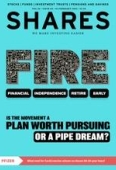Can you trade stocks within a pension?

Given you cannot make withdrawals from a pension until you reach age 55 (rising to 57 in 2028) it is unsurprising some people assume you cannot actively manage any investments within your pot.
At Shares we have had correspondence from people over whether you can trade stocks within a pension so in this article we explain how buying and selling investments can be as simple as it is in other types of investment accounts.
Not only can you take an active hand in investments for your retirement but you should as your goals and investment time horizon change. Just how active you might be is an issue we will discuss later on.
There are several different categories of pension. These include workplace pensions: including defined benefit (DB) schemes (also known as final salary pensions) and defined contribution (DC) schemes, as well as personal pensions of which a self-invested personal pension (SIPP) is the most relevant for our purposes.
A SIPP gives you the most flexibility to trade in and out of investments and operates very much like a Stocks & Shares ISA or standard share dealing account.
You can trade a wide range of investments within your SIPP not just stocks. Options include funds, investment trusts, exchange-traded funds (ETFs), bonds and gilts.
CAN I MAKE REGULAR INVESTMENTS?
You can make regular investments through your SIPP; on the obvious prerequisite you have enough money in your cash account to pay for them.
Most mainstream investment platforms will allow you to invest in a range of shares, funds, trusts and ETFs regularly at a discounted rate.
SIPPS: WHAT CAN'T YOU INVEST IN
Commercial or residential property
Insurance company bonds
Private (unquoted) company shares
Works of art, cars etc.
Loans
Gold bullion
HOW OFTEN CAN YOU TRADE WITHIN YOUR SIPP?
You can trade as little or as often as you want through your SIPP, but you will incur costs by doing so. You might expect to pay around £10 for trading shares, ETFs or trusts, and less if you trade regularly, with typically a much lower cost for trading funds. Costs can make a significant difference to returns over a long period so it is certainly something to bear mind if you plan to buy and sell investments in your SIPP on a regular basis.
For some investors this will mean it makes more sense to invest in low-cost, diversified ETFs or tracker funds and other investments which are intended to be bought and held for the long term.
Important information:
These articles are provided by Shares magazine which is published by AJ Bell Media, a part of AJ Bell. Shares is not written by AJ Bell.
Shares is provided for your general information and use and is not a personal recommendation to invest. It is not intended to be relied upon by you in making or not making any investment decisions. The investments referred to in these articles will not be suitable for all investors. If in doubt please seek appropriate independent financial advice.
Investors acting on the information in these articles do so at their own risk and AJ Bell Media and its staff do not accept liability for losses suffered by investors as a result of their investment decisions.
Issue contents
Daniel Coatsworth
Editor's View
Education
Feature
Great Ideas
Investment Trusts
News
- Pfizer beats earnings expectations but still has a lot to do to recapture former glories
- Chinese stock market rocked by $330 billion Evergrande liquidation
- Why shares in fashion victim Superdry have slumped 50% year-to-date
- InterContinental Hotels continues to benefit from strong travel demand
- Luxury goliath LVMH shows resilience but Diageo serves up sobering results

 magazine
magazine








